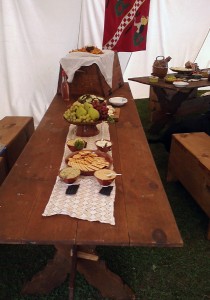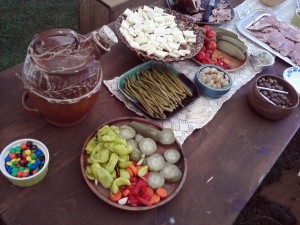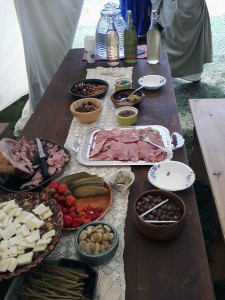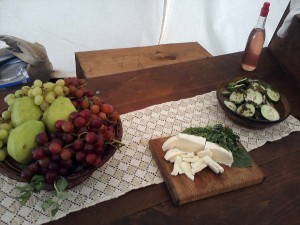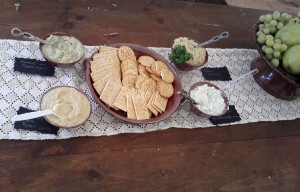
Oxymel
This recipe and documentation was for the paneling by the East Kingdom Brewers’ Guild at Great Northeastern Way 2013. Their suggestions are below the documentation…
Period, circa 9-10 century from Cild’s Anglo-Saxon Leech book
This “southern acid drink” and “southern Italkini drink wrought of vinegar and honey” of was a base for some medicinals, as well as one all on its own, suggested for hiccups and spewing, among other things. The additions are numerous including a variety of worts and also radishes, and rind of alder, but I chose to make the plain, simple hiccough remedy and cure for the “half dead disease.”
“If a man be sick of the half dead disease or epileptic, work him Oxymel, a southern acid drink, a mixture of vinegar and honey and water. “Take of vinegar, one part; of honey, well cleansed, two parts; of water, the fourth part; then seethe dow
n to the third or fourth part of the liquid, and skim the foam and the refuse off continually, until the mixture be fully sodden. If thou wish to work the drink stronger then put as much of the vinegar as of the honey and use the leechdom either for this disorder or for full nigh any one.
Take always of the acid drink, so wrought, as much as may seem good to thee.
For these disorders put a radish into the liquor of the drink; let it be in for the space of a night; then give in the morning to the sick man, after his nights fast, the radish so liquored to eat, as he best may; and then when the radish is gone, poir thou hot water on the remains of the liquor; give it to the sick man to drink to the full….”
Translation from Leechdoms, wortcunning, and starcraft of early England. Being a collection of documents, for the most part never before printed, illustrating the history of science in this country before the Norman conquest. Collected and edited by the Rev. Oswald Cockayne, 1864
http://archive.org/stream/leechdomswortcun02cock#page/n11/mode/2up
Recipe
“Take of vinegar, one part; of honey, well cleansed, two parts; of water, the fourth part; then seethe down to the third or fourth part of the liquid, and skim the foam and the refuse off continually, until the mixture be fully sodden. If thou wish to work the drink stronger then put as much of the vinegar as of the honey…”
Redaction:
1 cup vinegar
2 cups honey (generic commercial honey)
1 cup water
The whole mix was put in a non-stick pot and boiled for 15 minutes; foam skimmed at that point and about every 5 minutes or so until the mix had reduced by roughly half. (Or what looked like half in the pot.)
The mix ratio is important for tasting. A blog about this beverage (with mint) suggested 8 oz water and 1 oz of syrup for a pleasing beverage. This mix is appropriate, because if too much it is very strong, and if too dilute the taste is, according to my taster, “ok but if beige were a taste this would be it.”
It is a pleasant enough thing cold when properly mixed; warm it would be a lovely base for a hot toddy. I did not have hiccups to test, though I expect I will be in a state to try it as a half-dead disease remedy at some point.
Preparation for the Panel
Take a glass of cold water, mix the drink so it is roughly 1:8 syrup to water and stir. I did this with a silver cup and metal spoon, with regular water from the event site. The act of mixing the syrup made an impression on the panel as it is an extra step. While my original vessel was not very period, the serving vessel into which I prepared the beverage was moreso, which actually caused one adjudicator to adjust his score in my favor.
It was the first non-alcoholic beverage so paneled in memory and received a Craftsman level score. What would have improved the score would have been:
- Use a more period source of honey, like a local beekeeper, or best of all, keep bees (this has to do with the complexity part of the scoring)
- Make the vinegar myself from wine, or better, make the wine from which the vinegar would come
- Present it in a more period vessel (I brought it in a clear bottle which had a snap-cap, like on a Grolsch bottle) such as a ceramic bottle or an amphora – the latter of which I actually even have, and in ceramic even- doh!
- Bring the radish. I actually had radishes with me, and should have prepared one glass of the half-dead disease cure, because that would have been one more thing similar to the original recipe. (And also likely funny as all get out.)
I do plan to try this again with some of those suggestions in mind, maybe not pitching wine and making vinegar, but with using locally sourced honey and home-made wine vinegar at least. The panel did enjoy the beverage though, which is really the point in the first place!
_____________________________________
I found the recipe online here:
The text is here: http://archive.org/stream/leechdomswortcun02cock#page/n11/mode/2up
A table is well enough furnished where the flagons are filled with good malt liquor ; it is flat heresy, they say, to discover mischief in University ” particular :” but, notwithstanding, the Saxons drank also mead, an exhilarating beverage, which from its sweetness must have been better suited to the palates of the ladies, and which was of an antiquity far anterior to written or legendary history. They had also great store of wines, which they distinguished by their qualities, as clear, austere, sweet, rather than by their provinces or birth. They made up also artificial drinks, oxymel, hydromel, mulled wines, and a Clear drink, or Claret/”^ of the nature of those beverages which are now called cup.
Of hiccupings. Hiccup comes on either by reason of re- pletion, or of emptiness, or of austere juices biting upon tlie stomach, and when these are vomited forth it ceases. Many also by only taking the medicine called ” by the three ” peppers,” if immediately on that they swallow wine, hiccup. It is also a recognized fact, that some turning their food sour,
hiccup ; and many also hiccup after shivering.We shall find then that a vomit is a sufficient cure for those who liiccui^ from repletion or irritation ; and the application of warmth for those that do so from chill. But when the hiccup comes on by fulness of moistures, it needs a violentevacuation ;
and this sneezing produces ; but sneezing does not cure the hiccups which depend on emptiness. Give thesufferer from hiccup rue with wine, or nitre in sweetened wine, or seseli, or carrot, or cummin, or ginger, or calamintha, or Keltic valerian. These arc proper for the cases in which food turns sour on the stomach, or for chill, or for emptiness. But for those that suffi^r by repletion Avith cold and viscid humours, give castoreum, three obols worth, and to drink some oxymel, etc. “voided, inasmuch as they have a bad etfect in clo.sini; Book il. the inwards, and they collect the swelling, and it doth not easily disperse,^ hence neither apples nor wine must be given, since they have a hot breath or (ironia. The man must take a not sharp wine ; one must also give him some oxymel, which is a southern or Italkni drink, wrought of vinegar and of honey : and when the burning of the heat bcginneth to wane away, chiefly through the mie, he must have lettuces and the inward part of southern poppy. Tokens that the swelling in the liver may not abate, nor run off; that that man hath a heavy sore in the parts of the nether liver, even as if he were weighted with something of a burden in the right side, and he hath not a heat of fever in these parts. To such a man must be given the drinks and the leechdoms, which we taught one should use for the insensible hardness begun in the liver ; with them let him make the obstructive mischief nesh. If any one applietli the leechdom Avhich unlocketh and draweth out the obstinately lodged matters, before he hath made nesh the badly hardened swelling, he weeneth that he is amending it ; hut if there be aught left of the hard inatter, he amendeth it not, but harmethj and with the leechdom he drietli the hu- mours, and the swelling becometh as hard as a stone, and it cannot be dissipated nor be made nesh.”
“In case that the upper part of the bell}’ is filled with evil sordid humour, a thing which hap- peneth to the men who in much continued drinking take nutritious meats, or who spew, and chiefly after meat, and who are subject to nausea, they are all over blown as tvith wind, and the wamb is extended and they frequently have breakings. To these men one must give oxymel with radish ; that is a southern leechdom : and then they soon spew up the thick cor- ruption, and it is well with them. Work up the leech- dom thus, from vinegar and from honey ; take the best honey, put it over the hearth, seethe away the wax and the scum, then add to the honey as much vinegar, so as that it may not be very austere nor very sweet ; mingle together, and set by the fire in a crock, boil upon good gledes, clean and lively, till Lhe TTiixture be mingled, so that it may be one, and have the thickness of honey, and on tasting it the austere sharpness of the vinegar may not be too evident. If the wamb is full of wind, that cometh from luke- warm humour ; the cold humour worketh sores. For that shall one seethe cummin in ale, and seed of march, and seed of more o?’ carot, and of dill. If the chill be greater, then add rue, and leaf of laurel, and seed of fennel sodden in oil. Then if the disease still annoy, introduce this through a pipe or a horn, as…
If however the distention from the vv^ind cometh suddenly, then these things cannot help, since that will turn into dropsy. If one applieth the warming leechdoms to that, then one eketh or augmentetk the disease. For a miltsiek man, one must give him vinegar in the southern leecli- dom which hight oxymel, which we wrote of against the half dead disease and disease of the bladder. Take rind of laurel, and dry mint, and pepper, and seed of rue, costmary, and Ao7’ehound, and centaury, that is herdwort, or by another name, earthgall, chiefly the juice of it, add these worts to the before named leech- dom into the ooze. Thou mayest see where we have spoken of the before named diseases, how thou shalt prepare the oxymel. Seethe in water rind of alder until there be of the water a third part unboiled away, and then give a good jug full of it to be drunk at three times ; leave always a days space between the doses. This same is beneficial for a loinsick man. Again, of the black ivy, first three berry bunches, next five, then seven, then nine, then eleven, then thirteen, then fif- teen, then seventeen, then nineteen, then twenty-one, give them so, according to the days, to be drunk in wine. If the man have fever also, give thou him the little grains of the ground ivy in hot water to drink. This same is good for a loinsick man. Again, give him to drink earthgall sodden in wine. Again, boil betony in wine, give him that to drink.Again, when the mUt becometh upblown, soon it will harden, and then it is not easy to cure, when the blood hardeneth on the veins of the milt: then treat it with the before named worts, mingle the good worts with oxymel, the southern acid drink, which we before wrote of, they will cure the milt and will do away the thick and livery ‘ blood, and the evil humours, not by the mie only, but also by the other evacua- tion passage or outgang. Lay on externally the lesser herdwort beaten up. Take also roots of clover, put them in vinegar, and goat treadles, then work them to a salve, and add thereto barley meal ; give the man also this in wine to drink.
This beverage was paneled at GNEW in July 2013 and received a score of 71.7.

